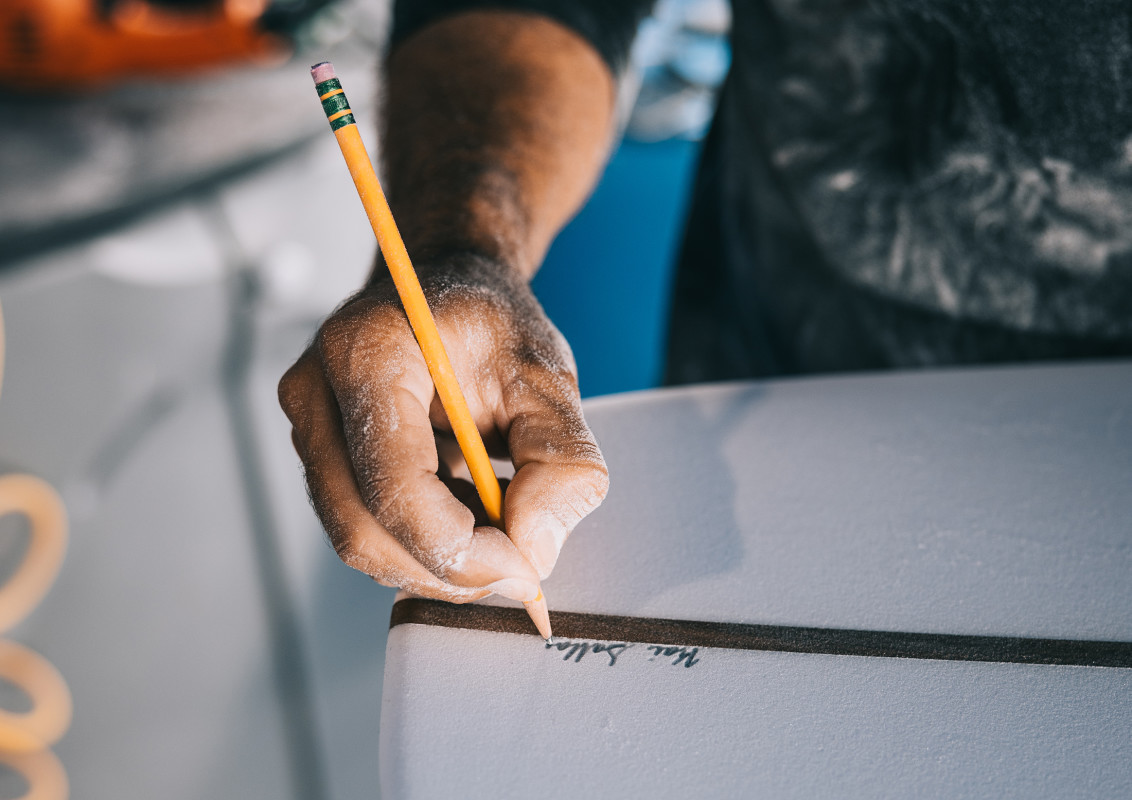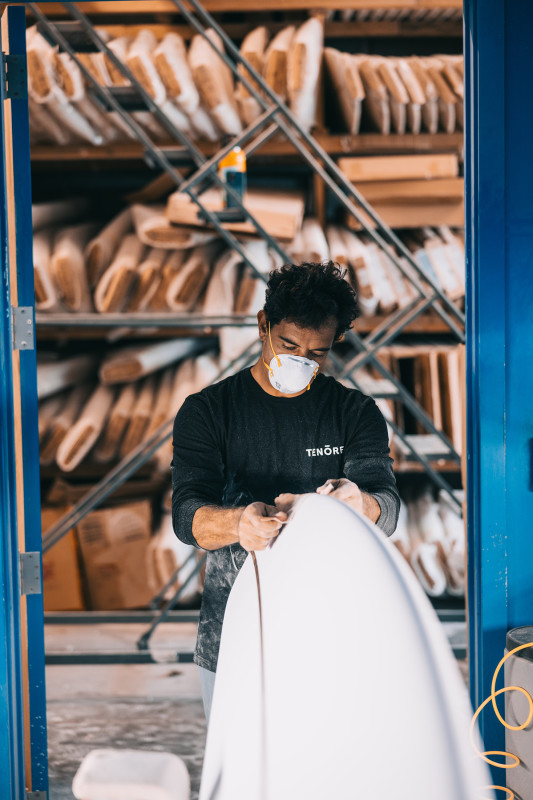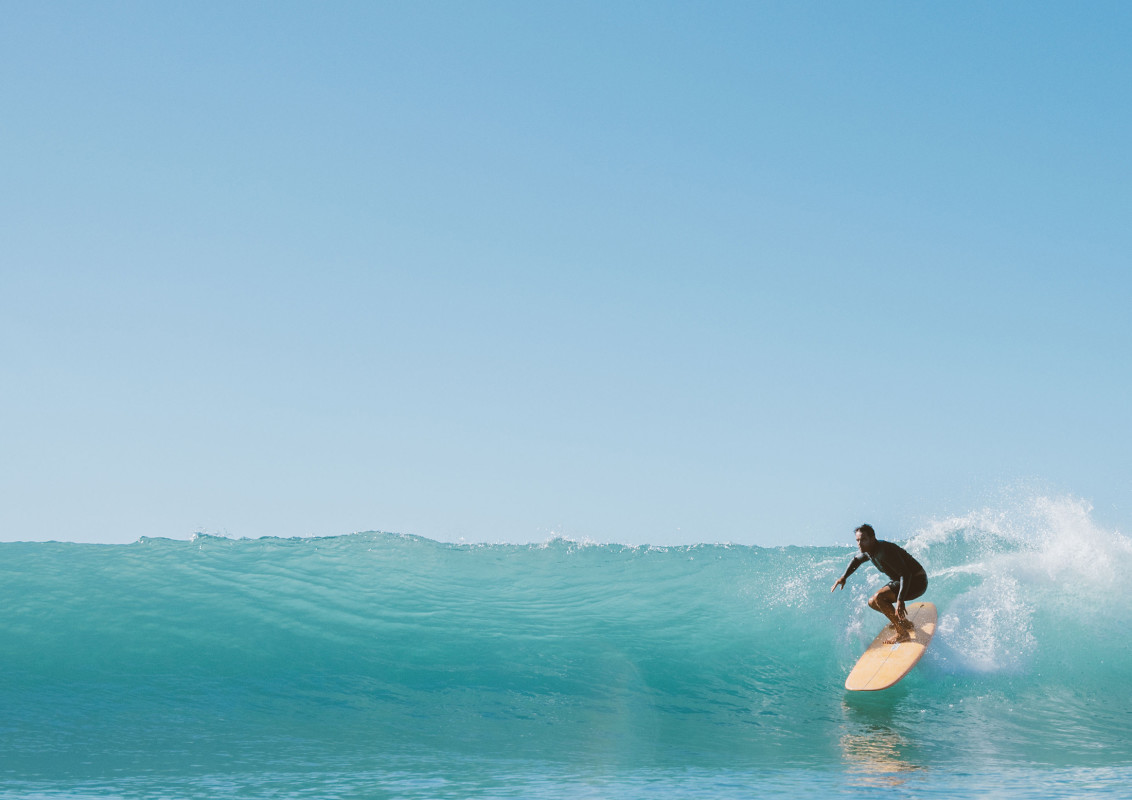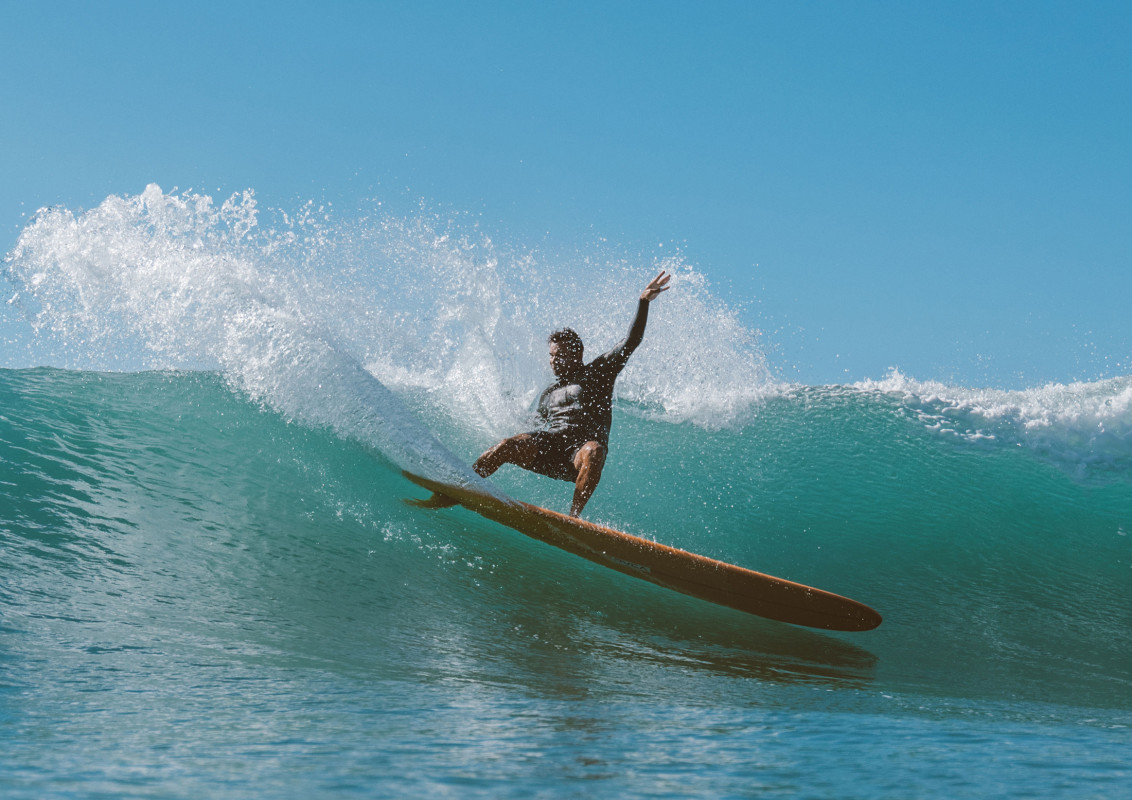The son of a Waikiki beach boy, Kai Sallas is no stranger to a life spent around the ocean. Raised on Oahu’s south shore, Sallas spent his formative years bodyboarding in Waikiki. Then, when he was 10, Sallas transitioned to a longboard and discovered a talent for stylishly maneuvering a 9-foot-plus board. And by the time he was 12, Sallas knew he wanted to dedicate his life to chasing a world title in longboarding.
In 2005, Sallas qualified for the ASP Longboard Tour and was on track to achieve his dream. Around the same time, he landed a board sponsorship with legendary longboarder and shaper Donald Takayama, becoming a team rider for Hawaiian Pro Designs.
“I remember going out to his factory in Oceanside and he pulled me in his room and showed me a board he was making,” says Sallas. “I got to see all the boards in production, from glassing to showroom and everything. I would watch him shape and I thought it was the coolest thing in the world.”

Tommy Pierucki
While surfing Pipe in 2006, Sallas snapped a longboard. He took the board’s remnants, stripped the glass, and shaped a 5’0” Frankenstein swallow tail fish using hand tools. He glassed it himself and was pleased to find that it was fun to ride. Over the years, as he broke more boards, Sallas continued to fine tune his shaping skills.
In 2012, Takayama passed away and Tommy Maus took over as his ghost shaper. When Maus’s time came to retire, Sallas decided to take making his equipment into his own hands (literally). By 2019, he founded the Kai Sallas Longboard Company.
After spending so much time watching Takayama shape, and experimenting with his own boards over the years, Sallas had a solid baseline for starting his brand. Pulling inspiration from Takayama’s models, his local surf breaks in Waikiki, and his experience competing on tour, Sallas began crafting his own longboards. After a lot of trial and error, he had a fleet of models that he was ready to share with the world.
“It’s kind of like a cook, cooking food that they want to eat,” says Sallas. “My models are just based off of boards that I feel like I want to surf and made for surfing that I want to do.”

Tommy Pierucki
To create his boards, Sallas starts out in Shape 3D, a surfboard design software that allows him to fine tune his shapes. Next, he grabs a blank, gets it cut, puts the finishing touches on it, and sends it off to get glassed. Although Sallas does do some hand shaping, he prefers making production boards as the machine allows him to easily make small tweaks and adjustments.
Because Sallas is a competitive surfer, one of his goals is to offer high-performance boards capable of competing at a world-class level. As such, Sallas incorporates Thunderbolt Technology into his boards, which utilizes advanced materials to decrease weight and enhance performance. Where most mass-produced epoxy boards are built with durability in mind, Thunderbolt is focused on performance.
“Thunderbolt puts the performance of the board first,” says Sallas. “The characteristics of the epoxy resin and the amount of glass they’re able to put on the boards naturally makes them stronger but that wasn’t the original goal. I wanted my shapes to be built using the best construction so when people bought one of them, I knew they were getting the best possible board.”
Being both a shaper and pro surfer, Sallas test drives all the boards himself. He’s constantly experimenting with new models and perfecting his older models, too.

Tommy Pierucki
“If I’m working on a model, I’ll make one, test it, change what needs to be changed over and over until I get it right,” says Sallas. “Being able to do everything myself, nothing gets lost in translation.”
Although Sallas has had many successes over the course of his competitive career, a world title has always eluded him. But in 2023, after nearly 20 years on the longboard tour, that finally changed. Kai Sallas won his first world title.
Heading into the final in Malibu, California, Sallas took a step back to analyze the type of board he would need to win. Because Malibu is a fast, down-the-line wave, Sallas wanted a board that could do long, fast nose rides in the pocket. He created a brand-new board featuring a moon tail shape: the Blue Moon.
“It was so rewarding to not only win the title, but to win on a board that I made entirely myself,” says Sallas. “It was a goal of mine since I was 12 years old, so to finally win at 42 was incredible.”

Tommy Pierucki
Looking forward, Sallas plans to shift gears. He intends to spend another year or two on tour, with the sole purpose of having fun now that he’s fulfilled his lifelong dream. After that, he plans to focus on his team riders.
When Sallas started KSLCO, he wanted to help support some of the young, local talent. He compiled a small team of riders, including Kaniela Stewart (2023 men’s runner-up) and Kelis Kaelopaa (2023 women’s runner-up). Sallas has watched Stewart and Kaleopaa surf since they were young. He knows their unique strengths and fancy footwork inside and out and, as such, is able to shape single-fins catered to their event-dominating skillsets.
“After I’m done competing, I want to be the corner man of Kelis and Kani and help them win world titles,” says Sallas. “And then I have two daughters that are really loving longboarding right now, and I want to support them if they want to compete.”
To learn more about Sallas’s boards, check out his website here.

